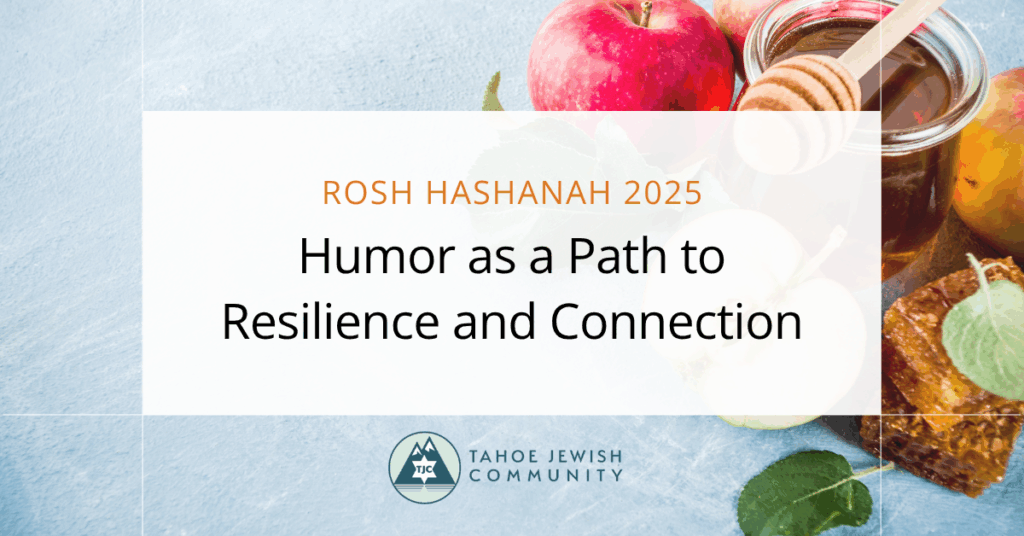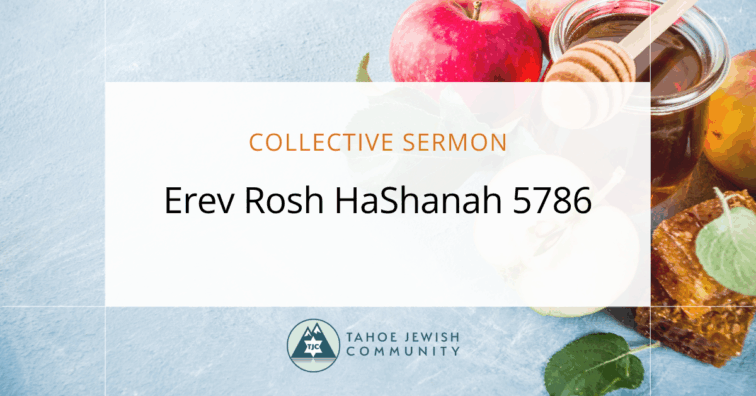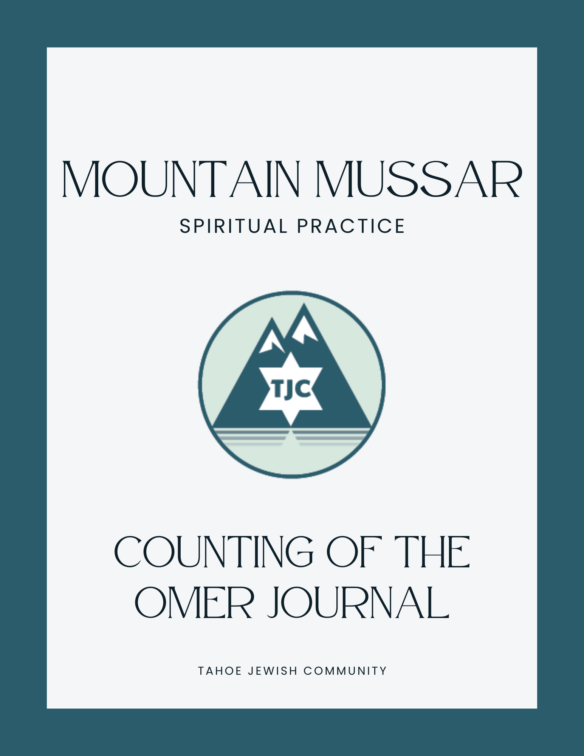As we enter 5786, the world feels, in a word, interesting. From global upheavals to local tensions, from political strife to rising antisemitism, the headlines often leave us feeling anxious, divided, and uncertain. Yet within the Jewish tradition lies a tool for navigating these turbulent times—one that can help us connect, heal, and even laugh.
In this year’s Rosh HaShanah sermon, we explore just that:
Rosh HaShanah Sermon 2025: Humor as a Methodology for Cultivating Resilience and Creating Connections
When I was about 9, my Aunt Gail introduced me to a song written in 1958, called the Merry Minuet by the Kingston Trio.
The lyrics start out thusly:
They’re rioting in Africa
They’re starving in Spain
There’s hurricanes in Florida
And Texas needs rain
The whole world is festering
With unhappy souls
The French hate the Germans
The Germans hate the Poles
Italians hate Yugoslavs
South Africans hate the Dutch
And I don’t like anybody very much
Tweak a word or two, here or there – like the fact that Yugoslavia has broken up since 1958 – and this song from over 70 years ago remains a more or less accurate rendition of our world’s current news cycle.
And as a result, it’s been one of those kind of years that I have started to deeply appreciate the old Yiddish curse: “may you live in interesting times.” And interesting, in this case, does not always mean good. Our headlines have been filled not only with political strife and wars abroad, but with growing division here at home — neighbors shouting past each other instead of speaking with one another. For Jews, these “interesting times” have carried a particularly sharp edge, as antisemitism has surged to levels not seen in generations: in schools, on social media, on the streets of our towns and cities. What once felt only uncomfortably familiar to me, thanks to growing up in Virginia, now feels uncomfortably familiar to everyone around the country, as age-old hatreds find new platforms and new voices. The Merry Minuet reminds us that anger and suspicion are not new; but in this moment of our history, when hostility and fracture seem to be on the rise everywhere we look, we are called to ask: what hope, what courage, and what sense of possibility can we bring into this new year? What wisdom does Judaism have to offer us?
Both luckily and unluckily, we aren’t the first Jews in all of history to face a challenging social landscape.
Born in 1939 in Jerusalem, Amos Oz became one of the preeminent Israeli poets about war and peace. His brilliant semi-autobiographical book, A Tale of Love and Darkness, traces his family’s immigration to Israel in the context of anti-Semitism and his childhood and adolescence growing up in Israel, as it battled its way into statehood. It remains a seminal work of modern Jewish literature. So when I saw a little pamphlet by him in Ben-Gurion Airport on our way home from my second oldest’s bar mitzvah in the winter, I did what any book-hoarding dragon would do: I bought it. First published in 1988 (and then updated in the early 2000s), Amos Oz’s How to Cure a Fanatic is subtitled: Israel and Palestine, Between Right and Right. In it, he describes a world in which that urge to believe only my truth matters, only my pain is real, only my people deserve compassion; or alternatively, a world in which we believe that we, ourselves, are undeserving of compassion – it remains painfully relevant.
Oz’s primary argument is this: Humor is a vital tool to create connections between different individuals and a deeper understanding of ourselves. In 1988, he wrote:
I know it is an unusual message in these days of violence and anger and revenge and fundamentalism and racism, all of which are loose in the Middle East and elsewhere. A sense of humor, the ability to imagine the other, the capacity to recognize the peninsular quality of everyone of us may be at least a partial defence against the fanatic gene which we all contain. (p. 81, Amos Oz’s How to Cure a Fanatic)
Additionally, he advocates for humor as a vitamin that supports not just our compassion for others, but also care and perspective when we perceive ourselves. He wrote:
Humor is relativism, humor is the ability to see yourself as others may see you, humor is the capacity to realize that no matter how righteous you are and how terribly wronged against you have been, there is a certain side to life that is always a bit funny. The more right you are, the more funny you become.
Humor has long been an important part of Judaism.
It is all over the Torah. Before they shifted into the realm of “Dad jokes”, puns used to be considered the highest form of humor. And, half of our ancestors in the Torah are named puns. Abraham loosely translates into “Father of God’s people”, Isaac as “laughing”, Jacob as “heely” – because he grasped his twin brother’s heel as he was born – and then the very WWE friendly name “God wrestler” once he became Israel. And don’t forget Moses, whose name in ancient Egyptian translates to “anonymous’s son”, after he was drawn anonymously from his watery basket in the Nile.
The central role of humor as an aspect of Jewish wisdom and culture isn’t just limited to the Torah and our ancestors’ names. Throughout the centuries, Jewish tradition has never been shy about laughing at the human condition. Think of Tevye in Fiddler on the Roof, shrugging at the unfairness of the world and still cracking, “God bless the Czar — and keep him far away from me.” That single line captures centuries of Ashkenazi resilience: the ability to wink at suffering without denying it, and to turn complaint into comedy, survival into song. (And by the way, if you’d like to see Tevye live and in person, please talk to Dan Dickerman, Pam Taylor, and Heidi Doyle about our community’s ticket block for the regional performance of Fiddler this November — get your tickets now!)
Our sages tell a story in the Talmud (Talmud Bavli, Tractate, Ta’anit, Daf 22a) about Rabbi Baruqa of Huza, who often visited the marketplace at Lapet. One day, he encountered none other than the prophet Elijah; he asked Elijah: “Is there anyone here who will merit a share in the World to Come?” Elijah’s answer was stark: “None.” But then, two men walked by, and Elijah pointed to them: “Those two will have a share in the World to Come.” Rabbi Baruqa rushed to ask about their profession. Their response was simple: “We are jesters. When we see someone sad, we cheer them up. When we see two people fighting, we help them make peace.” Who shall bring redemption, but the jesters?
Centuries later, the Baal Shem Tov, the founder of Hasidism, was struck by this teaching as he was asked for an explanation by one of his students. He said that these two jesters had a remarkable gift: they could trace every matter in a person’s life back to its source in the higher realms. That gift of healing humor allowed them to annul harsh decrees. But when someone was too weighed down in sadness, the connection couldn’t be made. So the jesters lightened that person’s heart with laughter, clearing the way for blessing to flow. (Keter Shem Tov 272)
And it turns out that our tradition is not the only source to recognize the healing power of humor. Modern medicine echoes what our sages intuited. The Mayo Clinic reports that laughter isn’t just “nice to have” — it actually reshapes us, body and soul.
When we laugh, we do more than lighten our emotional load. We spark real physical change. A good, belly-deep laugh floods the body with oxygen, stimulates the heart, lungs, and muscles, and prompts the release of endorphins—the brain’s natural “feel-good” chemicals. Laughter jolts our stress system into gear and then resets it, leaving us more relaxed, with lowered heart rate and blood pressure. Even our muscles unclench, tension eases, and the body itself exhales.
But the gift of laughter isn’t only short-term. Over time, laughter builds resilience. It strengthens the immune system, counteracting the stress chemicals that so often wear us down. It can ease pain through the body’s own natural painkillers. It helps us endure challenges with greater perspective and even lifts the fog of depression or anxiety, replacing it with energy and hope. And — just like those jesters in the marketplace — it draws us closer to others. A shared laugh can be the start of trust, a thread of connection, a reminder that none of us carry our burdens alone.
Additionally, according to Nuraly Akimbekov and Mohammed Razzaque’s study Laughter therapy: A humor-induced hormonal intervention to reduce stress and anxiety for the National Institute of Health wrote:
Laughter therapy is a universal non-pharmacologic approach to reduce stress and anxiety. Therapeutic laughter is a non-invasive, cost-effective, and easily implementable intervention…Laughter therapy can physiologically lessen the pro-stress factors and increase the mood-elevating anti-stress factors to reduce anxiety and depression. In this ongoing stressful period …, it is important to create a cheerful environment that will facilitate laughter among the family, neighbor, and community to cope with the stresses…
They continue:
Laughter therapy may be used for both preventive and therapeutic purposes. Laughter can also be a clinical predictor of functional disability. An analysis of 14,233 elderly individuals (aged ≥65 years), selected for the ‘Japan Gerontological Evaluation Study’, a low frequency of laughter has shown to be linked to a higher risk of developing functional disability (Tamada et al., 2020); adjusting the potential confounders, the investigators reported an increased hazard ratio of functional disability among the individuals with decreased frequency of laughter. About 1.42 times higher risk of functional disability was noted among the individuals with low or no laughing habits (Tamada et al., 2020).
Humor, then, is no trivial thing. However, it must serve as a bridge, not a wall. Not all humor heals. Our tradition is clear: words can wound as surely as sticks and stones. Jewish law calls it ona’at devarim, the sin of verbal wronging (Bava Metzia 58b). Modern psychology backs this up: what researchers call “affiliative humor” — the kind that brings people closer — the kind that I call “healing humor”, strengthens trust. But “aggressive humor” — the kind that puts people down — erodes relationships and fuels anxiety. Or, to put it in everyday terms: compassionate healing humor ages like a fine wine; cruel humor ages like milk left out at a picnic on a hot day.
The kind of humor we choose matters. It shapes whether we divide or unite, whether we dismiss or dignify, whether we wound or heal. Research on affiliative or healing humor confirms what Proverbs (17:22) proclaimed long ago: “A joyful heart is good medicine.” Humor, when used with care, becomes a healing force — restoring trust, softening conflict, and reminding us of our shared humanity.
But maybe you are at the point of the sermon where you are thinking to yourself: “It’s great, Rabbi, that the Jewish people have always used humor as a modality for resilience, and I love that science now backs that up, but MY jokes just never land. How will I possibly develop this kind of healing humor?” Well, as the Mayo Clinic website says: “Are you afraid that you have an underdeveloped — or nonexistent — sense of humor? No problem. Humor can be learned.”
So how do we ensure that the laughter we offer is connective, caring, and compassionate — rather than harsh, harmful, or hard to hear? Let me suggest a few guidelines for healing humor.
First: Laughter must be consensual.
Humor imposed on someone in deep, raw pain rarely heals — it often feels like denial. Famous therapist and Holocaust survivor, Viktor Frankl, reflecting on concentration camp life, in his book Man’s Search for Meaning, wrote that humor could be a survival tool, but only when chosen and shared freely, never forced on others. Modern psychology sometimes calls this kind of forced humor: “toxic positivity”. It is the attempt to paste a smile over suffering; and it inadvertently invalidates the emotional reality of the moment. It isolates the person who is hurting. If humor is going to heal, it must honor pain before it lifts it.
Second: Humor should open the heart, not bypass the truth.
Rabbi Nachman of Breslov, who urged his followers to find joy at all times, also wrestled with profound despair. His teaching reminds us that joy and sorrow are not enemies, but companions. Healing humor doesn’t sweep grief under the rug; it acknowledges sorrow and then offers a gentle reframing. Psychology calls this “cognitive reappraisal”—the ability to look at the same reality from a new angle or a new framing. In other words, we don’t laugh instead of crying; we laugh after crying, because we’ve made a little more space in our hearts.
Third: Timing matters.
As Kohelet/Ecclesiastes teaches, there is “a time to weep and a time to laugh” (Ecclesiastes 3:4). Well-timed humor can dissolve tension like sunlight breaking through clouds. Poorly timed humor, though, can reopen wounds. In their article in the journal Illness, Crisis, and Loss, Ruth Dean and David Gregory report that research in palliative care confirms: a laugh at the right time eases suffering; a laugh at the wrong time deepens it. Good humor is like good weather — timing matters.
Fourth: Humor is an outreached hand, not a performative punch.
The Talmud tells us that Rabbah began his lectures with a humorous remark to lighten his students’ hearts before teaching serious Torah (Shabbat 30b). That’s the model: humor not as an offence, but as an offering. Brené Brown reminds us that it’s our shared imperfections that create real connection (Daring Greatly, 2012). Often, it’s not the polished punchline that heals — it’s the gentle self-deprecating remark, the playful silliness, the reminder that we’re all delightfully, imperfectly human.
So as we enter this new year, let us choose humor that dignifies rather than dismisses, that connects rather than cuts, that heals rather than harms. That kind of humor that our tradition teaches us to wield.
As Amos Oz reminded us, each of us carries a little “fanatic gene” – the kind that prevents compassion for others and even for ourselves, the kind that sees the world through a lens of painful rigidity, the kind that the Torah calls a “hardening of the heart”. But he also offered us a cure: humor. Not the biting kind that divides, but the healing kind that opens and softens the heart. Humor that reminds us that we’re not isolated islands, but peninsulas—each of us jutting out in our own direction, but still connected to the same great continent of humanity.
That’s really what Jewish humor has always been about. It’s not just about getting a laugh; it’s about surviving, connecting, softening the edges of a hard world. From Isaac’s name—“he will laugh” — to Tevye blessing the Czar “and keeping him far, far away,” our tradition has taught us that laughter is a kind of spiritual oxygen. It helps us breathe again when the air is thin.
And yes, the scientists now confirm what some bubbes already knew: laughter lowers blood pressure, relieves stress, boosts the immune system, and might even keep us from becoming cranky old men and women before our time. But more than that, laughter builds bridges. A shared laugh doesn’t just lighten the load; it ties us together. Don’t tell my grandmother’s ghost this, but it might even be better for you than chicken soup.
This year, with antisemitism rising, with divisions growing, with too many headlines reminding us of the Merry Minuet’s refrain that “the world is festering with unhappy souls,” we need those ties more than ever. So here is our task for 5786: to wield Jewish humor not as a weapon, not as a denial, but as a gift. To laugh with, not at. To bring joy that heals, not jokes that wound. To use humor as Amos Oz suggested — as a way to soften hearts – including our own – as an antidote to fanaticism, and as a bridge to one another.
If we can do that — if we can laugh with compassion, joke with kindness, and smile through the tears — then we won’t just survive these “interesting times.” We will have the opportunity to live through them with resilience. We will have the ability to meet them with hope. And maybe, just maybe, we will even make them a little less interesting.
Shanah Tovah.
Why This Matters for 5786
Humor is not just entertainment; it’s a survival skill. From the playful puns in Torah names—Isaac, Jacob, Moses—to Tevye’s wry wisdom in Fiddler on the Roof, Jewish humor has always served as a bridge across generations, a balm for hardship, and a lens to view ourselves and our world with perspective.
As Rabbi Lauren reminds us, humor can be a healing force: lowering stress, boosting resilience, and connecting us to one another in ways that transcend conflict. In a year marked by division, wielding humor compassionately—“to laugh with, not at”—is more than a choice; it’s a practice of Jewish wisdom.
A Challenge for the New Year
So as we step into 5786, consider this your invitation: cultivate healing humor. Laugh with intention. Share joy that uplifts. Allow your laughter to be a bridge rather than a wall. In doing so, we don’t just endure these “interesting times”—we rise to meet them with hope, compassion, and connection.
Shanah Tovah, and may this year be filled with laughter, resilience, and joy.



